Fire Breaks Out At Hospital In Tehran, No Casualties Announced
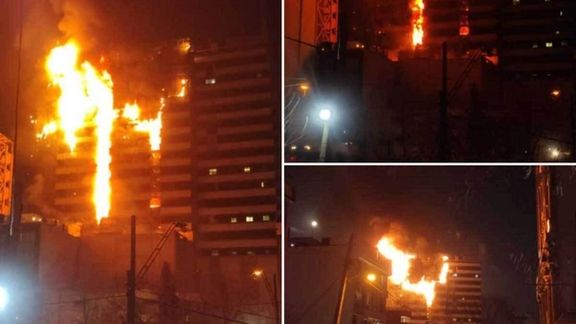
A huge fire broke out at a hospital in Iran's capital Tehran on Thursday, with Iran's Health Ministry spokesman claiming that no one is injured.

A huge fire broke out at a hospital in Iran's capital Tehran on Thursday, with Iran's Health Ministry spokesman claiming that no one is injured.
There were no immediate reports of casualties or the cause of incident, with an official saying the blaze had engulfed the building's exterior facade.
State TV said the area around the Gandhi Hospital in northern Tehran has been cordoned off and the hospital was being evacuated.
Pedram Pak-Ayin, the spokesperson for the Health Ministry, said that "none" of the workers and patients at Gandhi Hospital have been harmed.
He added that the cause of the fire is not clear and added, "The patients of Gandhi Hospital are being transferred to other medical centers."
According to Deputy Health Minister Saeed Karimi, 80 patients have been transferred from Gandhi Hospital to surrounding medical centers.
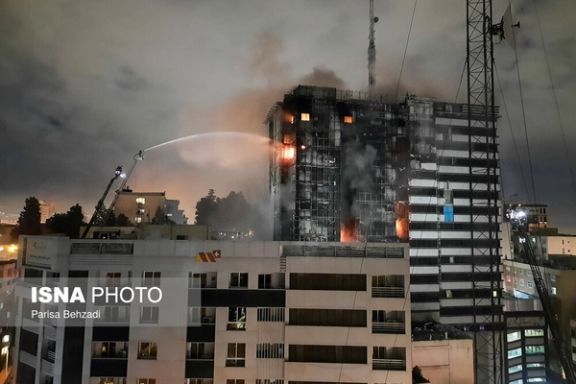
Tehran Fire Department spokesperson Jalal Malaki said the fire started at 1900 local time (1530 GMT) and firefighters had been dispatched to the area.
"Initial reports indicate that the fire primarily affected the exterior of the hospital building," Maleki told state TV.
According to information from the Gandhi Hospital website, the complex has 100 beds, 17 operating rooms, and 100 residential suites.
No exact information has been released about the number of patients and other people inside the hospital at the time of the fire.

Recruitment of clerics as teachers and new legislation allowing mosques to run private schools has fueled concerns about the future of Iran's educational system.
In a statement published on its Telegram channel on January 18, the Coordination Council of Iranian Teachers’ Unions strongly criticized the employment of clerics as teachers by the education ministry.
The statement alleged that this meant “purging schools” from expert teaching staff and replacing them with clerics and seminary students who have no expertise in child education, or a standard education. The teachers’ union called the decision a “reactionary move” that resurrects the concept of schools run by the clergy (maktab), which were abolished nearly a hundred years ago. The ministry has denied a nationwide purge is underway.
However, hardliners controlling the parliament and the executive branch have been also purging university faculties and openly speak about “purification.”
The powerful Shiite clergy in Iran lost its monopoly on education and the justice system with the establishment of modern courts and schools by the founder of the Pahlavi Dynasty, Reza Shah, in the 1920s who fundamentally curbed their powers.
The council also warned Iranian families about the consequences of “the systematic presence of clergy in schools and its dangers to children.”
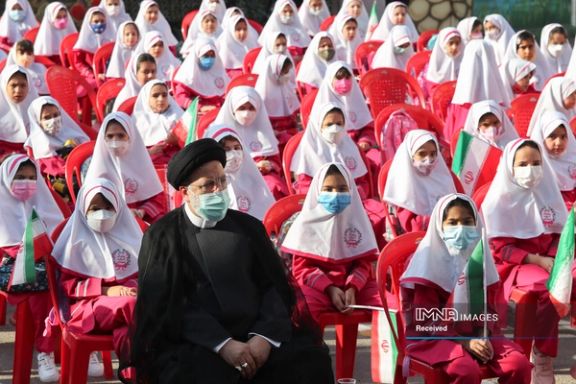
The ministry has expelled scores of teachers and forced many others to retire early for supporting last year’s protests, instead hiring 3,500 clerics and seminarians as teachers to fill some of the tens of thousands of new positions it has created to overcome the shortage of teaching staff.
Ali Farhadi, the ministry’s spokesman, has claimed that the ministry only became aware of the recruitment after the fact. “We, too, found out that these individuals had been accepted [for the positions] after the examinations [of candidates for teaching positions] were held,” he claimed. However, regime-controlled media have been talking about the subject for months, saying that clerics should become schoolteachers.
The clergy have been running unofficial schools for over a decade but last week the establishment of “mosque-centered schools” was given official status when lawmakers hastily approved a proposal to oblige the ministry of education to issue licenses to persons and legal entities to establish private schools attached to mosques if building requirements were met.
In a report entitled “Autonomous Schools” Monday, the reformist Ham-Mihan newspaper said there are around 150 so-called “mosque-centered” schools with around 7,000 students now that operate unofficially.
An administrator of a “mosque-centered” school for girls told Ham-Mihan that their curriculum included homemaking, sewing, cooking and traditional medicine as well as computers and mobile photography to their students. They also selected and screened their own teachers, he said, but could not issue any kind of certificates under the current circumstances.
Former Minister of Education Mohsen Haji Mirzaei told Ham-Mihan that mosque-centered schools are "a rebellion against the official educational system" and warned that they could “delegitimize” the formal education system and foster extremist beliefs.
Speaking to the conservative Farhikhtegan newspaper, Rezvan Hakimzadeh, former Deputy Minister of Education, also expressed concern about the curriculum of these schools. “Who will supervise how the curriculum is replaced if the official one is to be disregarded? Who will approve of its suitability?” he asked.
Other critics such as another former education minister, Ali-Asghar Fani, have warned that the education ministry may fail to supervise these schools due to the political influence of the imams of the mosques to which they are attached.
Lawmakers supporting the legislation such as Ahmad-Hossein Fallahi, spokesman of the Education, Research and Technology committee, argue that schools attached to mosques can answer the dire need for more educational facilities, but claim the education ministry will have control over the curriculum of these schools.
An organization calling itself ‘Mosque-Centered Schools Headquarters’, says on its website that those behind the drive aim to “fulfil the heavy task of training and preparing an efficient revolutionary workforce” to meet the need for “human resources worthy of the Islamic Revolution.”
The organization’s secretary, Hossein-Ali Deylam, told Ham-Mihan that establishment of schools attached to mosques started in the religious city of Mashhad twelve years ago. He claimed that the number of these schools has grown since then due to the great demand from families who want their children to study in these schools, most of which are at the primary level.
“From the start, these schools have not been under the supervision of education ministry … Each school determines its tuition fees based on its activities and specifications,” he said without elaboration on their curriculum.
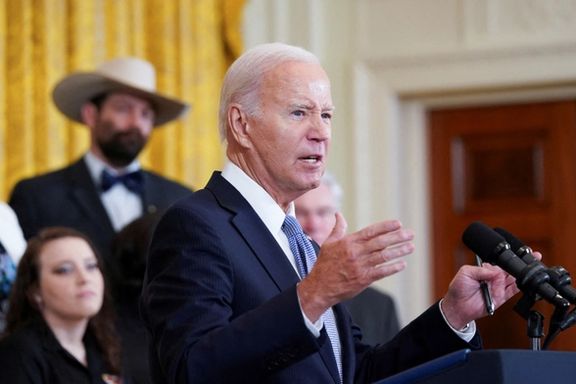
A recent online poll in the United States reveals that 61 percent of Americans believe the Biden administration's Iran policy has failed.
Moreover, a significant majority, 76 percent, believe that the Gazan militant group, Hamas, is receiving support from Iran in its war waged on October 7 against Israel.
Two thirds (67 percent) of voters expressed support for the US actively striking against terrorist groups with 74 percent of voters endorsing retaliatory attacks on the Houthis in Yemen for the blockade of global shipping in the Red Sea and the group's targeting of US ships. A further 84 percent advocate for increased military responses if the Houthis persist in the blockade on the route which accounts for 12 percent of global trade.
The survey also highlights public sentiment towards Iran and its proxies in the Middle East, with 74 percent of respondents affirming the belief that the Houthis receive guidance and assistance from Iran. Additionally, 63 percent agree that sanctions against Iran should be intensified in light of the more than 100 attacks on US targets in the region since October 7 and the US backing of Israel's retaliatory bombardment of Gaza following the Hamas atrocities of what was the single most deadly day for Jews since the Holocaust.
The monthly poll, a collaboration between the Center for American Political Studies at Harvard (CAPS) and the Harris Poll and HarrisX, surveyed 2,346 registered voters.
The Iranian government has refrained from direct military engagement in the Gaza conflict, opting to avoid escalation with Israel and the US. Nonetheless, its proxy militias in the Middle East have increasingly targeted US and Israeli interests, along with international shipping routes in the Red Sea.
The United States maintains a presence of 900 troops in Syria and 2,500 in Iraq, supporting and advising local forces to counter the resurgence of the Islamic State which had previously seized significant territories in both countries in 2014 before facing defeat.
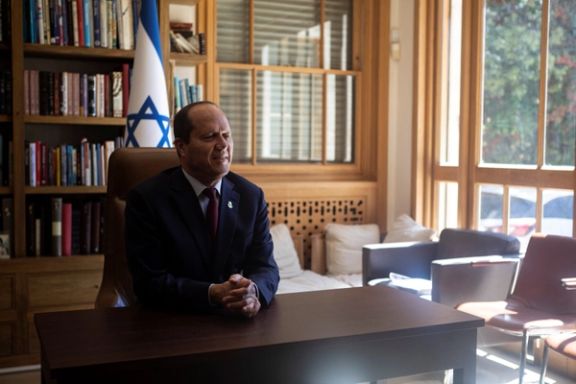
Israeli's minister of economy and industry has claimed that after Iran's proxy activities across the region, Tehran has become a 'legitimate target' for military action.
In an exclusive interview with The Telegraph, Nir Barkat said, "Iran is a legitimate target for Israel. They will not get away with it. The head of the snake is Tehran."
Since the Hamas invasion of Israel on October 7, Iran's proxies in Iraq, Syria, Yemen and Lebanon have joined a regional coalition against both Israel and the US, including a blockade on global shipping in the Red Sea.
"We should very very clearly make sure the Iranians understand that they will not get away with using proxies against Israel," Barakat, who has no input to the war cabinet, told the newspaper.
Barkat, tipped as the favorite to succeed PM Benjamin Netanyahu to take over the ruling Likud party, said, "we should very very clearly make sure the Iranians understand that they will not get away with using proxies against Israel".
The terror attack by Hamas on October 7, resulting in the deaths of at least 1,200 mostly civilians, has triggered a wide scale regional conflict. Described as the most deadly single day for Jews since the Holocaust, Iran has distanced itself from the day known as the Black Sabbath, but has commended Hamas for the atrocities, lauding it a victory against Israel.
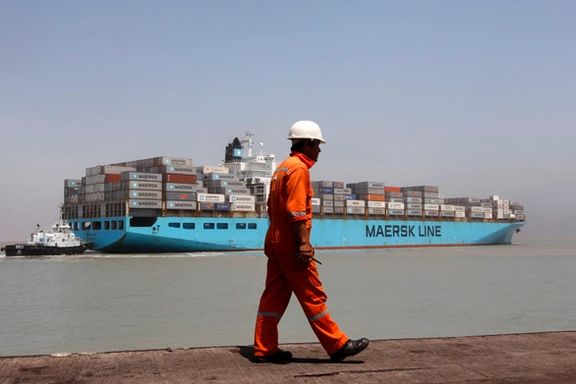
The director general of the Ports and Maritime Organization in Iran’s Sistan and Baluchestan province said there are still challenges faced by Iranian ships in Indian ports.
Qasem Askari Nasab, addressing reporters during a press conference on Thursday, underscored the hurdles Iran faces in the global arena, with Mundra port emerging as a focal point of concern.
Hossein Shahdadi, Deputy of the Ports and Maritime Organization in Sistan and Baluchestan, elaborated further to ILNA, stating that “while commercial activities between ports remain unhindered, specific shipping lines encounter obstacles in docking ships due to contractual complexities.”
The remarks follow earlier revelations by an Iranian transportation official, highlighting the necessity for global ports to obtain approval from the US Office of Foreign Assets Control before accommodating Iranian vessels. Masoud Daneshmand, a member of the board of directors at the Center of Transport Institutions, echoed the sentiment, emphasizing that numerous Iranian shipping assets are subject to sanctions, resulting in their inactivity.
The United States imposed fresh sanctions in March on entities associated with Iran's shipping and petrochemical sectors. The sanctions align with a 2018 executive order that reinstated measures targeting Iran's oil, banking, and transportation industries. Additionally, in 2019, the Office of Foreign Assets Control issued a cautionary advisory to global entities engaged in shipping petroleum or related products from Iran, alerting them to potential repercussions.
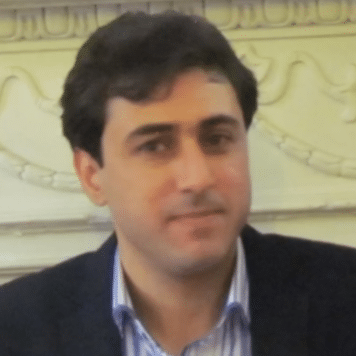
The United States has announced a bounty of up to $15 million for any information leading to the apprehension of Iranian businessman Hossein Hatefi Ardakani.
Ardakani is accused of aiding in the acquisition of technology for attack drones sold to Russia. He faces sanctions and charges for his alleged involvement in procuring dual-use technology utilized in drone production by Iran's Islamic Revolutionary Guard Corps (IRGC).
The decision to issue the bounty comes amidst growing concerns over Iran's provision of drones utilized in various conflicts, including Russia's war on Ukraine. The Commerce Department, responsible for administering US export controls, disclosed the bounty as part of a broader effort to combat national security threats.
“US-origin flight guidance components procured by the Ardakani network have been identified in recovered wreckage of Shahed drones in Ukraine and other conflict zones. Additionally, the Ardakani network has illegally procured US export-controlled high electron mobility transistors (a.k.a. HEMTs) and other components with ballistic missile applications, as well as other electronics with weapons application,” said Rewards for Justice, the fusion intelligence center created by the State Department that oversees domestic and foreign intelligence committees.
Despite an outstanding warrant for his arrest, Ardakani remains at large, with Tehran listed among his possible locations. People with information on Ardakani's whereabouts are encouraged to come forward through channels including Signal and WhatsApp.
The huge bounty underscores the gravity of sensitive technology proliferation amidst ongoing conflicts. US agencies are stepping up collaboration to enforce export controls, signaling heightened penalties for violators. The move aligns with the Biden administration's call for increased vigilance among businesses to prevent Iran's acquisition of materials supporting its ballistic missile program.
Ardakani joins a long list of wanted figures with bounties on their heads such as Irish gang leaders in Dubai and Somali militants. In January, a $10m reward was offered for information regarding financiers of Iran-backed Palestinian militia, Hamas.